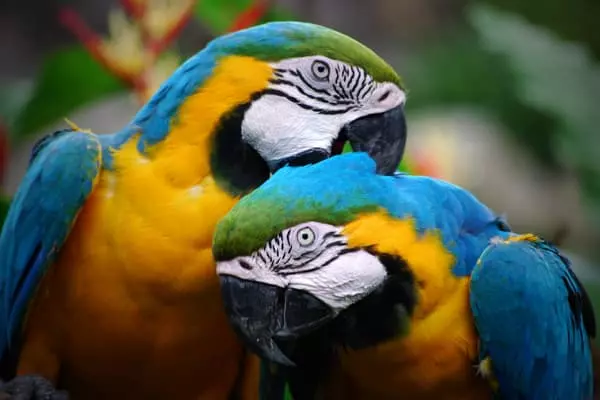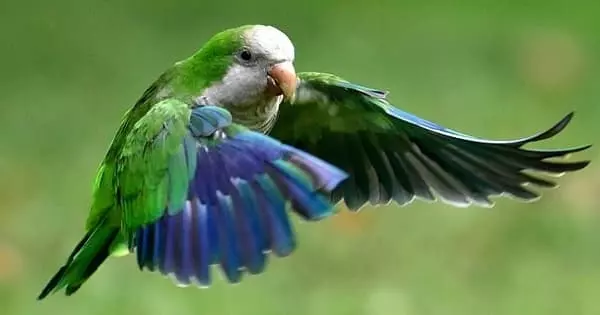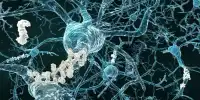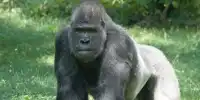According to a new study that helps to explain why many intelligent animals struggle in captivity, the smarter the bird, the more unique welfare needs it has in captivity. The findings are also important for intelligent bird owners to ensure that they feed their bird’s naturalistic diets rather than processed foods.
According to a first-of-its-kind U of G study, the smarter the bird, the more unique welfare needs it has in captivity. According to the study’s lead author, Dr. Georgia Mason, director of the University of Guelph’s Campbell Center for the Study of Animal Welfare, this finding could apply to other intelligent captive creatures such as great apes, elephants, and whales.
Mason, a professor in the Department of Integrative Biology, said, “This study provides the first empirical evidence that intelligent animals can struggle in captivity.” The study also revealed for the first time that greater intelligence, which is advantageous in the wild, can impede large-brained parrots’ adaptation to captivity. Approximately half of the world’s parrots are now kept in homes, zoos, or breeding facilities.
Most parrots are highly social, but they are frequently housed alone and in monotonous and predictable conditions. Some species appear to adapt well to captivity, but others should be avoided unless you have a lot of time and creativity. These intelligent species are also more invasive, which is another reason to treat them with caution.
Dr. Georgia Mason
“What’s novel about this study is that we show why some species are endangered while others are not.” The study, which was published in the Proceedings of the Royal Society B, emphasizes the need for cognitive stimulation as well as foods that require more complicated physical handling to improve bird care. Heather McDonald, a former University of Guelph PhD student who now works at Mount Sinai Health in Toronto, as well as researchers from the University of Bristol in the United Kingdom and Utrecht University in the Netherlands, are co-authors.
The researchers examined two main data sources.
One example was a survey on captive breeding success conducted in the early 1990s involving over 30,000 birds in the United States. The researchers also conducted an online survey with nearly 1,400 pet parrots from 50 different species to look for stereotypic behavior, or abnormal activity such as biting at cage bars, chewing or even eating feathers, and swaying, bouncing, or rote pacing in cages.
They examined housing conditions, brain size-body weight ratios (a measure of intelligence), diets, and other factors, employing a technique that allows evolutionary biologists to identify inherited traits that predispose species to risk.

They discovered that species whose natural diet consists primarily of nuts, seeds, and tough-coated insects are more likely to pluck, chew, or even eat their feathers. All other forms of stereotypic behavior were more likely in parrot species with relatively large brains. This finding suggests that instead of feeding processed foods to domestic birds, owners should provide them with naturalistic diets. Foraging accounts for 40 to 75 percent of the time spent by wild parrots.
Mason believes that parrots may have evolved the need to crunch and manipulate their beaks even when their food is ready-processed and presented in a bowl, or that they may require specific nutrients in natural diets.
“We’re not sure which is more important to feather-plucking birds. So, ideally, owners should provide naturalistic food items in their entirety so that parrots have to break their way in and do extractive foraging, just like they do in the wild.”
Cockatiels, Jandaya parakeets, and yellow-naped Amazons, for example, do well in the home. However, relatively large-brained parrots like Nanday parakeets, monk parakeets, and some cockatoos have more psychological issues.
“These intelligent species are also more invasive, which is another reason to treat them with caution,” Mason said. Most parrots are highly social, but they are frequently housed alone and in monotonous and predictable conditions. “Some species appear to adapt well to captivity, but others should be avoided unless you have a lot of time and creativity.”
She believes that owners should provide more stimulation for their birds, such as more naturalistic aviaries, puzzles, and other enrichment items. “This is already being done by good parrot caregivers. If you’re new to parrots, choose a species that is likely to thrive. Choose parrots that are a good fit for your environment and lifestyle.”
Approximately half of the world’s estimated 100 million parrots are kept in captivity, the majority as pets in private homes. More than 40% of species in the wild are threatened or near threatened, according to Mason, who has discussed her new research with the World Parrot Trust. “It’s critical from a conservation standpoint to have good parrot welfare.”
















